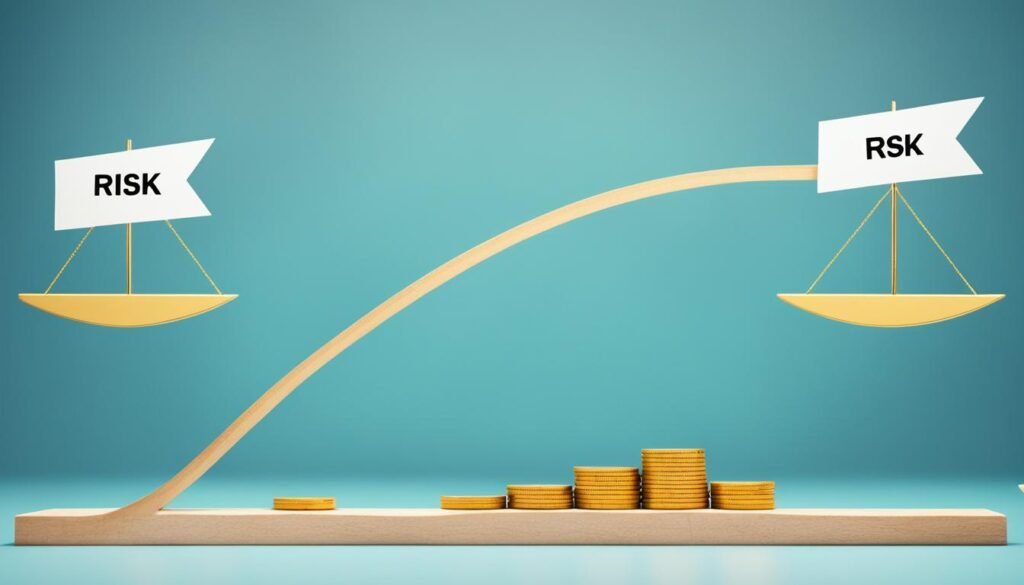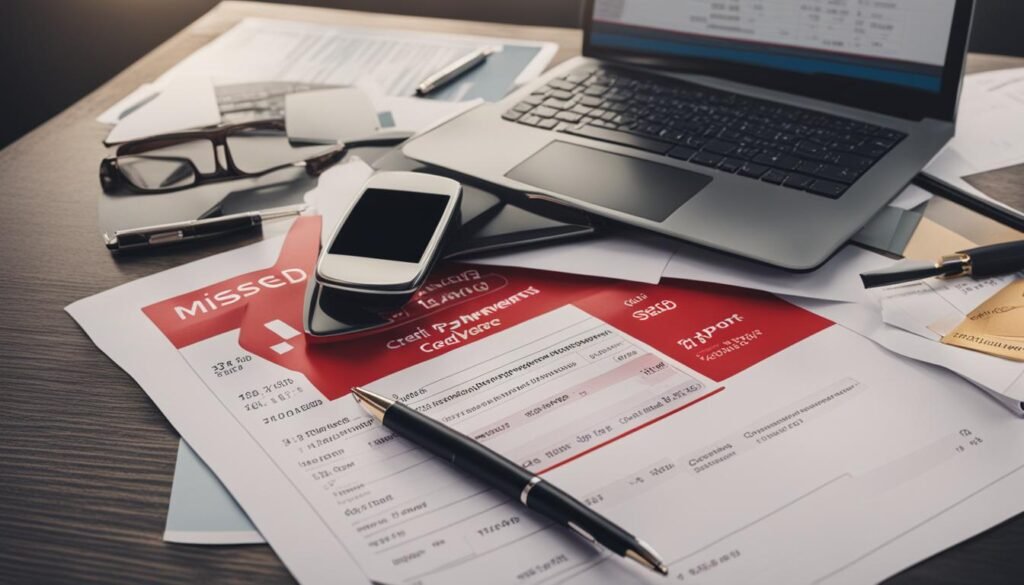An unsecured loan, also known as a personal loan, is a type of loan that does not require any collateral. Unlike secured loans which are backed by assets like a home or a car, unsecured loans rely solely on the borrower’s creditworthiness. While unsecured loans offer the advantage of not putting your property at risk, they also come with certain risks and considerations. It is important to weigh the pros and cons before applying for an unsecured personal loan. Factors such as higher interest rates, fees, and limited loan amounts may make it more difficult for individuals with lower credit scores to obtain approval for an unsecured loan.
Key Takeaways:
- Unsecured loans, also known as personal loans, do not require collateral.
- These loans rely solely on the borrower’s creditworthiness.
- While they offer flexibility, unsecured loans often have higher interest rates.
- Fees and limited loan amounts may also be a consideration.
- Individuals with lower credit scores may face difficulties in obtaining approval.
The Difference Between Secured and Unsecured Loans
When it comes to borrowing money, understanding the difference between secured and unsecured loans is crucial. These two types of loans have significant distinctions that impact factors such as interest rates, loan amounts, collateral, and credit score requirements.
Secured Loans:
A secured loan is a type of loan that requires borrowers to provide collateral, such as a house or a car, to secure the loan. If the borrower defaults on the loan, the lender can claim the collateral as a means to recover their losses. This collateral serves as a form of protection for the lender, reducing their risk in case the borrower fails to repay the loan.
The presence of collateral in secured loans affects several key factors:
- Interest Rate: Secured loans typically come with lower interest rates compared to unsecured loans. Lenders are more willing to offer favorable rates because they have collateral as security.
- Loan Amount: Since secured loans are backed by valuable assets, lenders are often more willing to provide larger loan amounts. The value of the collateral plays a significant role in determining the loan amount.
Unsecured Loans:
Unlike secured loans, unsecured loans do not require borrowers to pledge any collateral. Instead, these loans are issued solely based on the borrower’s creditworthiness, which includes factors such as credit score, income stability, and employment history. Lenders evaluate these factors to assess the risk of lending money without any collateral.
The absence of collateral in unsecured loans leads to the following implications:
- Interest Rate: Unsecured loans typically come with higher interest rates compared to secured loans. Lenders charge higher rates to compensate for the increased risk they face in the absence of collateral.
- Loan Amount: Due to the higher risk involved, lenders may offer lower loan amounts for unsecured loans compared to secured loans. The loan amount is based primarily on the borrower’s creditworthiness and income stability.
Understanding the difference between secured and unsecured loans is essential when making borrowing decisions. Secured loans provide access to larger loan amounts with lower interest rates, but require collateral. Unsecured loans, on the other hand, do not require collateral but often come with higher interest rates and lower loan amounts. Evaluating your financial situation and creditworthiness can help you determine which type of loan is the most suitable option for your needs.
The Pros of Unsecured Loans
Unsecured loans offer several advantages for borrowers, making them a popular choice for those in need of fast and flexible funding. Here are the key benefits of unsecured loans:
- No Collateral: Unlike secured loans that require collateral, unsecured loans do not put your personal assets at risk. This means you don’t have to worry about losing your property if you default on the loan.
- Fast Approval: Unsecured loans often have a quicker approval process compared to secured loans. Some lenders even offer online applications with approval in as little as 24 hours. This allows you to access the funds you need promptly, without lengthy delays.
- Flexible Use of Funds: One of the significant advantages of unsecured loans is the freedom to use the funds for various purposes. Whether you need to pay off medical debt, consolidate high-interest loans, fund a vacation, or make home improvements, you have the flexibility to allocate the funds as per your needs.
- Multiple Lenders: There are multiple lenders that offer unsecured personal loans, giving borrowers a wide range of options to choose from. Online lenders and peer-to-peer lending platforms have made it easier than ever to access unsecured loans, ensuring that you can compare rates and terms to find the best fit for your financial situation.
Overall, unsecured loans provide borrowers with the convenience and flexibility to obtain the funds they need quickly, without the requirement of collateral. Whether you have a pressing financial need or want to take advantage of an opportunity, an unsecured loan can be a viable solution. However, it is crucial to consider the potential risks and weigh them against the benefits before making a decision.
Unsecured Loan Comparison
| Lender | Interest Rate | Loan Amount | Loan Term |
|---|---|---|---|
| ABC Bank | 8% | $5,000 – $50,000 | 1-5 years |
| XYZ Credit Union | 10% | $2,000 – $25,000 | 2-7 years |
| P2P Lending | 12% | $1,000 – $35,000 | 1-3 years |
The Cons of Unsecured Loans

While unsecured loans offer various advantages, there are some drawbacks to consider before applying for one.
Higher Interest Rates
Unsecured loans typically come with higher interest rates compared to secured loans. Since these loans do not require collateral, lenders view them as riskier, and to offset this risk, they charge higher interest rates. Borrowers with lower credit scores may face even higher interest rates, making the cost of borrowing more expensive.
Fees
In addition to higher interest rates, unsecured loans often come with fees that borrowers need to be aware of. These fees may include origination fees, application fees, and other charges. It’s important to carefully review the loan agreement and understand the fees associated with the loan to avoid any surprises.
Limited Loan Amounts
Unsecured loans generally offer limited loan amounts compared to secured loans. This is particularly true for individuals with lower credit scores who may be seen as higher risk borrowers. Lenders may be more cautious in lending larger amounts without collateral to reduce their own financial exposure.
Credit Score Impact
Defaulting on an unsecured loan can have a negative impact on the borrower’s credit score. Missed payments or a default can lead to a decrease in the credit score, making it more challenging to obtain future loans or credit. It’s important to carefully assess your ability to repay the loan before applying for an unsecured loan.
Comparison of Unsecured and Secured Loans
| Factors | Unsecured Loans | Secured Loans |
|---|---|---|
| Collateral Requirement | No collateral required | Collateral required |
| Interest Rates | Higher interest rates | Lower interest rates |
| Loan Amounts | Limited loan amounts | Higher loan amounts |
| Credit Score Impact | Potential negative impact | No impact on credit score |
It’s essential to carefully consider the downsides of unsecured loans and assess your financial situation before deciding to take on this type of loan. Understanding the potential risks and drawbacks can help you make an informed decision and choose the best financing option for your needs.
Factors Affecting Unsecured Loan Approval

When applying for an unsecured loan, several factors come into play in determining approval. Lenders carefully assess these factors to evaluate the borrower’s creditworthiness and ability to repay the loan.
Credit History
One of the key factors that lenders consider is the borrower’s credit history, which includes their credit score and payment history. A good credit history demonstrates a borrower’s responsible financial behavior and increases their chances of loan approval. Lenders generally prefer borrowers with higher credit scores and a track record of making timely payments.
Stable Income
Having a stable and secure source of income is crucial when applying for an unsecured loan. Lenders want assurance that the borrower has sufficient funds to repay the loan on time. A stable income not only showcases the borrower’s financial stability but also their ability to meet the monthly loan payments. Employment verification is often required to validate the borrower’s income.
Lien
In some cases, lenders may have the option to place a lien on the borrower’s assets to secure repayment. A lien gives the lender legal rights to seize the borrower’s property in the event of non-payment. However, imposing a lien usually requires legal action and is not a common practice for unsecured loans.
Credit Report
Lenders review the borrower’s credit report to get a comprehensive view of their creditworthiness. The credit report provides detailed information about the borrower’s credit history, including any past defaults or delinquencies. Lenders pay close attention to any negative marks on the credit report, as they may indicate a higher risk of default.
Employment Verification
Another factor that lenders consider is the borrower’s employment history and stability. Lenders may request verification of employment to assess the borrower’s ability to maintain a steady income and repay the loan. A consistent employment record strengthens the borrower’s case for loan approval.
In summary, credit history, stable income, lien, credit report, and employment verification are all crucial factors that lenders assess when determining the approval of an unsecured loan. Borrowers should be mindful of these factors and work towards maintaining a good credit history, stable income source, and positive employment record to improve their chances of successfully obtaining an unsecured loan.
Interest Rates and Fees for Unsecured Loans

When considering unsecured loans, it’s important to understand the interest rates and fees associated with this type of borrowing. Unsecured loans generally come with higher interest rates compared to secured loans, as they do not require any collateral. The specific interest rate for an unsecured loan depends on factors such as the borrower’s credit score and the loan amount.
As of May 2021, interest rates for unsecured personal loans ranged from 3% to 36%. This wide range reflects the varying risk levels associated with different borrowers and loan amounts. Borrowers with higher credit scores and lower loan amounts are more likely to qualify for lower interest rates.
In addition to interest rates, borrowers should also be aware of the fees that may be charged when taking out an unsecured loan. Common fees include loan origination fees and upfront fees, such as application fees. Loan origination fees are typically charged upfront and are calculated as a percentage of the loan amount. These fees can vary among lenders, so it’s essential to compare offers and understand the full cost of borrowing.
Another important consideration is the potential for late payment penalties. Late payment penalties can be significant and may include additional fees or an increase in the interest rate. It is crucial for borrowers to review and understand the terms and conditions of the loan agreement to avoid any surprises or financial difficulties in the future.
To summarize, unsecured loans generally come with higher interest rates compared to secured loans. Borrowers should carefully review the interest rates, loan origination fees, upfront fees, and late payment penalties associated with unsecured loans to ensure they can comfortably manage the monthly payments and overall cost of borrowing.
Average Interest Rates for Unsecured Personal Loans
| Credit Score Range | Interest Rate Range |
|---|---|
| Excellent (800-850) | 3% – 5% |
| Good (670-799) | 6% – 10% |
| Fair (580-669) | 11% – 18% |
| Poor (300-579) | 19% – 36% |
Risks and Consequences of Defaulting on an Unsecured Loan

Defaulting on an unsecured loan can have serious consequences. When a borrower fails to make timely payments, the lender may report the delinquency to credit bureaus, resulting in a negative impact on the borrower’s credit report.
Additionally, the lender may take legal action, which could lead to wage garnishment and the seizure of assets. In some cases, the lender may enlist the services of a collection agency to collect the outstanding debt.
It is essential for borrowers to carefully assess their financial situation and ensure they can comfortably repay the loan before taking on an unsecured loan.
| Risks and consequences of defaulting on an unsecured loan |
|---|
| Negative impact on credit report |
| Potential legal action |
| Wage garnishment |
| Asset seizure |
| Debt collection by an agency |
Alternative Options to Unsecured Loans

If you are unable to obtain an unsecured loan or prefer alternative options, there are several alternatives to consider:
Secured Loans
Secured loans require collateral and can offer lower interest rates compared to unsecured loans. By pledging an asset such as your home or car, you can secure a loan and potentially enjoy more favorable terms.
Credit Cards
Credit cards can provide access to funds for various expenses. However, it’s important to note that they often come with high interest rates. Responsible credit card usage and timely repayments are vital to avoid accumulating debt.
Debt Consolidation
If you have multiple debts, consider debt consolidation. This involves combining all your debts into a single loan with more favorable terms, such as lower interest rates and extended repayment periods. It simplifies your debt management and can potentially save you money in interest payments.
Line of Credit
A line of credit is another alternative option. It provides you with a predetermined credit limit that you can draw from as needed. You only pay interest on the amount you borrow, making it a flexible financing solution.
Home Equity Loans
If you are a homeowner, you may consider tapping into your home’s equity for a loan. Home equity loans allow you to borrow against the value of your property. They often offer relatively low interest rates and can be used for various purposes.
It is crucial to carefully evaluate the terms and conditions of these alternative options before making a decision. Consider your financial situation, repayment capabilities, and long-term goals when exploring these alternatives.
Calculating the Total Cost of Borrowing

Before finalizing an unsecured loan agreement, borrowers should calculate the total cost of borrowing. It is essential to have a clear understanding of the financial implications and ensure that the loan is affordable in the long run. To assist borrowers in this process, a personal loan calculator can be a valuable tool.
By using a personal loan calculator, borrowers can input the loan amount and interest rate to determine the monthly payment and the overall cost of the loan over the specified loan term. This allows individuals to make an informed decision regarding their ability to repay the loan in a timely manner.
Understanding the total cost of borrowing provides crucial insights into the financial commitment involved. It empowers borrowers to assess their budget and ensure that the monthly payment is manageable and fits within their income and expenses.
Benefits of Using a Personal Loan Calculator:
- Provides an estimate of the monthly payment: By inputting the loan amount, interest rate, and loan term, borrowers can calculate the expected monthly payment. This helps in planning the budget accordingly.
- Helps determine the total cost: The calculator enables borrowers to assess the overall expense of the loan by considering the interest paid over the loan term. This gives a clear picture of the total amount to be repaid.
- Allows for comparison: By adjusting different loan terms and interest rates, borrowers can compare various loan options to find the most suitable one.
- Aids in financial planning: Calculating the total cost of borrowing helps in evaluating the affordability of the loan and making informed financial decisions.
Once the total cost of borrowing is determined, borrowers can evaluate whether the loan aligns with their financial goals and obligations. It is essential to prioritize loan terms and interest rates that are feasible and align with personal financial circumstances.
By utilizing a personal loan calculator, borrowers can make well-informed decisions, avoiding potential financial difficulties in the future. It provides a comprehensive understanding of the financial commitment involved, enabling borrowers to take control of their financial well-being.
| Loan Amount | Interest Rate | Loan Term | Monthly Payment | Total Cost |
|---|---|---|---|---|
| $10,000 | 5% | 3 years | $299.71 | $10,789.56 |
| $20,000 | 7% | 5 years | $396.35 | $23,781.16 |
| $30,000 | 9% | 7 years | $460.06 | $42,487.04 |
Conclusion
Unsecured loans provide individuals with a flexible financing option without requiring collateral. These loans offer benefits such as fast approval and flexible use of funds. However, borrowers must carefully consider the risks involved before taking on an unsecured loan.
Factors such as higher interest rates and limited loan amounts should be weighed against the benefits. Additionally, borrowers should be aware of the potential impact on their creditworthiness. It is crucial to assess one’s credit score and financial situation before applying for an unsecured loan.
Understanding the terms and conditions of the loan agreement is essential to making an informed financial decision. Borrowers should carefully review the interest rates, fees, and repayment terms to ensure they can comfortably repay the loan. If an unsecured loan does not meet their needs, individuals should explore alternative options such as secured loans or debt consolidation.
Overall, unsecured loans can be a valuable tool for obtaining funds quickly and without collateral. However, borrowers should thoroughly evaluate the risks, benefits, and their own creditworthiness to make the best decision for their financial well-being.
Also Refer : Multiple Personal Loans: Is It Possible?
FAQs
Q: What is an unsecured loan?
A: An unsecured loan is a type of loan that does not require any collateral to secure the loan may fixed rate life of the loan many lenders.
Q: How do unsecured loans work?
A: Unsecured loans work based on the borrower’s creditworthiness and ability to repay. Lenders offer unsecured loans based on the borrower’s credit history and financial situation installment loan get a personal loan.
Q: What are the risks of applying for an unsecured loan?
A: The main risk of applying for an unsecured loan is that if you fail to repay the loan, it can negatively impact your credit score and may lead to collection activities or legal actions by the lender minimum loan amount.
Q: What are the benefits of getting an unsecured loan?
A: The main benefit of getting an unsecured loan is that you don’t have to put up any collateral, such as a house or car, to secure the loan. Additionally, unsecured loans can be used for various purposes, such as debt consolidation, home improvements, or unexpected expenses.
Q: How can I apply for an unsecured personal loan?
A: To apply for an unsecured personal loan, you can typically visit a bank, credit union, or online lender and submit a loan application. The lender will then review your credit history, income, and other factors to determine if you qualify for the loan.
Q: What are the typical interest rates on unsecured loans?
A: The interest rates on unsecured loans can vary depending on the lender, your credit score, and the loan term. Generally, borrowers with good or excellent credit may qualify for lower interest rates, while those with lower credit scores may receive higher rates.
Q: What types of loans don’t require collateral?
A: Unsecured loans don’t require collateral, unlike secured loans such as mortgages and car loans. Personal loans, student loans, and credit card debt are common types of unsecured loans.
Q: Can I get an unsecured loan with low credit?
A: It is possible to get an unsecured loan with low credit, but you may receive higher interest rates or have difficulty qualifying for larger loan amounts.
Q: What is the minimum and maximum loan amounts for unsecured loans?
A: The minimum and maximum loan amounts for unsecured loans vary by lender and can depend on factors such as your credit score, income, and financial history.
Q: How can an unsecured loan help me consolidate debt?
A: An unsecured loan can help you consolidate debt by providing funds to pay off multiple high-interest debts, such as credit card balances, into a single, more manageable loan with a potentially lower interest rate.
Source Links
- https://www.investopedia.com/articles/personal-finance/111815/8-possible-risks-unsecured-personal-loans.asp
- https://smartasset.com/personal-loans/the-pros-and-cons-of-unsecured-personal-loans
- https://www.investopedia.com/terms/u/unsecuredloan.asp
